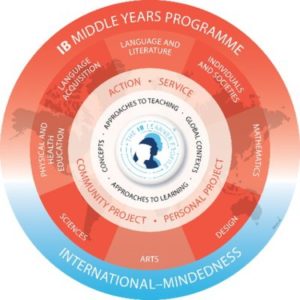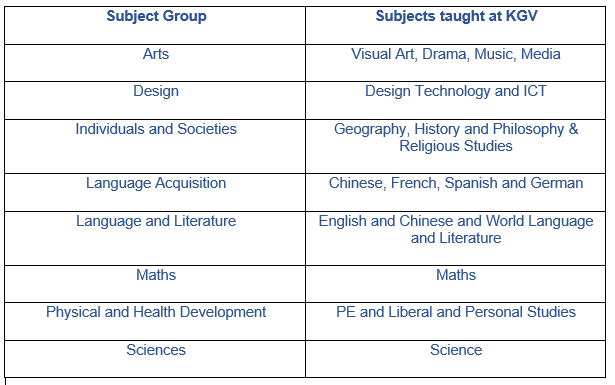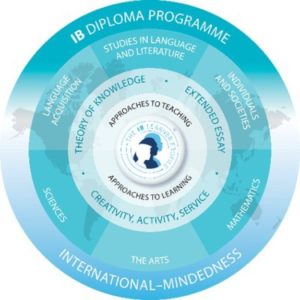KGV Curriculum

Year 7 - 9
Students study the International Baccalaureate Middle Years Programme (MYP) for three years. The MYP builds upon the knowledge, skills and attitudes developed in the IB Primary Years Programme (PYP) and prepares students to meet future academic challenges, including IGCSE, BTEC and the IB Diploma Programme (DP).
Teaching and learning in the MYP is framed by inquiry, action and reflection. Or more simply asking, doing and thinking. Students will be taught by subject specialists across the eight learning areas to enable students to engage in purposeful inquiry in a robust academic setting.
Each topic is concept driven and set within a global context. Conceptual learning focuses on organizing ideas that have relevance within and across subject groups. Concepts help to integrate learning for the student and deepen disciplinary understanding while building capacity to engage with complex ideas and apply them in new situations. Global contexts in planning and teaching helps students engage in purposeful learning by providing relevance and meaning of how their learning fits into the world.

The MYP framework has 8 equally weighted subject groups and students are expected to study from each of the groups.

All students enrolled in year 3 of the MYP are expected to complete the Community Project. The Community Project is completed over the course of one year and is a significant piece of self-directed inquiry driven by the students’ own interests and creativity. It is an opportunity to consolidate and celebrate learning. Over the course of the year, students are expected to demonstrate learning by investigating, planning, taking action and reflecting as they carry out sustained inquiry into a need within the community. Students will need to communicate effectively in a variety of situations and demonstrate responsible action. The final outcome will be in the form of a presentation and exhibition. The Community Project is assessed using assessment criteria prescribed by the IB. These criteria cover Investigating, Planning, Taking Action and Reflecting. Each criterion is marked out of 8, with 8 showing the student has achieved the highest level. A supervising teacher is appointed to each student completing the Community Project. The supervising teacher provides guidance and feedback on the process and completion of the project and ensures the project is safe to carry out. Supervising teachers will carry out standardization exercises to ensure projects and students are assessed fairly. Marks will be shared with students.
Our interactive and collaborative approach to teaching allows our students to become intellectually curious and fulfil the IBO Learner Profile in an academically rigorous context.
Year 10 & 11 Level 2 Qualifications
Year 10&11 follow the British GCSE, IGCSE or BTEC curricula and lead to examinations and qualifications in each subject. Typically each course span two years, in Years 10 and 11, with final exams and coursework presented in May or June of Year 11.
A good set of IGCSE qualifications can be useful for students hoping to go to University in the United Kingdom or in Hong Kong. In these places it is the level of the grades that students obtain that is much more important than the number of the grades. For other countries the qualifications are not particularly valuable, although the experience may well be.
In Addition to the core subjects, English, Science and Maths, Students will need to pick four further subjects from Languages, Individuals and Societies and Creative Arts. Students will attend lessons in subjects that are not examined such as P.E., PSHE and will be also be provided with differentiated lessons called WIN time that look to support, consolidate or extend their learning in a personalised way.
The optional courses are listed below:

* To study French, German or Spanish, students must be able to demonstrate prior learning in the chosen language that will indicate they will be able to access the curriculum in Year 10.
Year 12 & 13 Level 3 Qualifications
Students choose to either study a broad-based International Baccalaureate Diploma Programme (IBDP) or to focus their studies and follow a specialised vocational pathway which centres around one or more BTEC qualifications. IBDP and BTEC classes are capped at 16. These small classes enable students to grow as learners in a supportive and nurturing learning environment.
BTEC – Business & Technology Education Council (see HERE for more information)
BTECs are career-focused qualifications taken by over 1 million learners every year around the world. They have been developed in partnership with educators, employers and governments, and provide a flexible pathway – combining knowledge, skills and their application to real-life scenarios. They are an excellent way to progress to university. Click HERE for BTEC university recognition.
KGV currently offers BTEC qualifications in the following subjects: Sport; Business; Art & Design; Creative Media; Performing Arts.
Students can either choose to study an Extended Diploma (1080 guided learning hours) in a single BTEC subject or choose a combination of a Diploma (‘major’ – 720 guided learning hours) in one BTEC subject and a Subsidiary Diploma (‘minor’ – 360 guided learning hours) in a second BTEC subject depending upon their interests.
In addition, students may also select up to 2 standard level (SL) IB courses to study alongside their BTEC qualifications (see IB Diploma below for courses available).
We currently offer the following 3 extended BTEC programmes or combinations of Diploma and Subsiduary subjects to make up 18 units.
| BTEC sizes | Equivalent International A level sizes |
|---|---|
| Subsidiary Diploma (360 GLH) | 1 International A level |
| Diploma (720 GLH) | 2 International A levels |
| Extended Diploma (1080 GLH) | 3 International A levels |
IB Career-related Programme (IBCP) – KGV is currently applying for authorisation for this programme. See HERE for more information on the IBCP
International Baccalaureate Diploma
The IB Diploma consists of 6 optional subjects and 3 core subjects (ToK – Theory of Knowledge, EE – Extended Essay and CAS – Creativity, Activity, Service). The optional subjects are split into 6 groups – in general terms students must take one subject from each of the first 5 groups and one additional subject from group 6 or a second from group 1-4). There are some exceptions to this and these are shown below. Most subjects are offered at Higher Level (HL) and Standard Level (SL). Students must choose 3 HL and 3 SL subjects. All students take the 3 core subjects. The diagram illustrates how this works:

Common Combinations (others are possible but would need to be discussed)
One subject from Group 1 -6;
One subject from Group 1 – 5 and a final subject from Group 1 – 4;
One subject from Group 1,2,5, plus the ESS and two subjects from Group 6;
One subject from Group 1,2 5, plus the ESS and a final subject from either Group 3 or 4.
Students may also choose to study a Bilingual Diploma by selecting 2 subjects from group 1. Students following a Bilingual Diploma would not need to select a subject from Group 2.
Considerations
It is not recommended for students to take more than one new subject.
Do not take an ab initio language as an ‘easy’ option.
The Language dept have clear recommendations (see relevant information on Lionel)
* Environmental Systems and Societies (group 3 & 4) is an inter-disciplinary subject which means that students do not need to study a second subject from either of the groups that it represents as it meets the requirements of both subject groups in a single choice.
For more information on ALL options for year 12 and 13 students and the subject availability please click this link.
